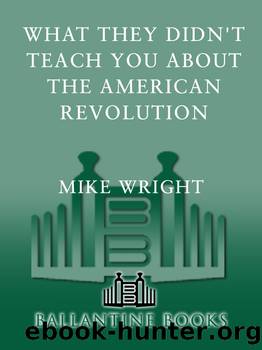What They Didn't Teach You About the American Revolution by Mike Wright

Author:Mike Wright [Wright, Mike]
Language: eng
Format: epub
ISBN: 978-0-307-54914-3
Publisher: Random House Publishing Group
Published: 2012-06-28T00:00:00+00:00
Cowboys bring to mind Americaâs Wild West. The word cowboy itself, however, goes back much further and even to a different country. In the Gaelic language of Ireland, it was buachaill bó, literally âboys who herded cows.â Until the twentieth century, whenever troops were engaged in or just training for war, they herded hogs and cattle with them. Those who herded the cattle often werenât soldiers but were hired for that sole purpose and were called cowboys. Our modern definition of cowboy didnât come until 1877, when it was first used in print.
Cowboy had a far less bovine meaning during the Revolution. A different place too: Westchester County, New York. It was in the so-called âneutral groundâ near New York City, where in 1775, Loyalists became noted for their barbarous treatment of opponents. They operated off and on throughout the war, stealing cattle and selling them to the British, and generally rousting out anyone who objected to English rule. In time that version of the word cowboy was applied to just about any lawless individual.
Loyalists, of course, didnât have the game to themselves. While Cowboys were on the British side, on the Patriot side were a group known as the âSkinners.â
This latter group was named for General Courtlandt Skinner, who raised a brigade of Loyalist troops in New Jersey. Originally they fought for and alongside the British. Later, however, they switched sides, becoming Patriots and doing to the Loyalists just what the Cowboys were doing to Patriots. This brought about frequent skirmishes between the Cowboys and the Skinners.
One incident began simply enough but evolved into one of the biggest scandals of the Revolution. It concerned a man traveling as John Anderson.
Dressed in civilian clothing, he was riding south on the east side of the Hudson River toward Tarrytown, when he came across three menââbushmen,â a Continental army lieutenant called themâloitering by a stream, playing cards. Bands of Skinners and Cowboys had been roaming the countryside in something of a no-manâs-land between the two armies, robbing anyone who wasnât on their sideâPatriot or Loyalist.
One of the men who stopped Anderson wore a British army coat, and the traveler assumed they were Loyalists. According to Lieutenant Joshua King, Anderson said to the men, âI hope, gentlemen, you belong to the Lower [Tory] party.â
â âWe do,â says one.
â âSo do I,â says [Anderson], âand by the token of this ring and key you will let me pass. I am a British officer on business of importance, and must not be detained.â
âOne of them took his watch from him and ordered him to dismount. The moment this was done, he said he found he was mistaken and he must shift his tone. He says, âI am happy, gentlemen, to find that I am mistaken. You belong to the Upper [patriot] Party, and so do I. A man must make use of any shift to get along, and to convince you of it, here is General Arnoldâs pass,â handing it to them, âand I am at your service.
Download
This site does not store any files on its server. We only index and link to content provided by other sites. Please contact the content providers to delete copyright contents if any and email us, we'll remove relevant links or contents immediately.
| Americas | African Americans |
| Civil War | Colonial Period |
| Immigrants | Revolution & Founding |
| State & Local |
In Cold Blood by Truman Capote(3374)
The Innovators: How a Group of Hackers, Geniuses, and Geeks Created the Digital Revolution by Walter Isaacson(3140)
Steve Jobs by Walter Isaacson(2888)
All the President's Men by Carl Bernstein & Bob Woodward(2362)
Lonely Planet New York City by Lonely Planet(2213)
And the Band Played On by Randy Shilts(2193)
The Room Where It Happened by John Bolton;(2150)
The Poisoner's Handbook by Deborah Blum(2131)
The Innovators by Walter Isaacson(2096)
The Murder of Marilyn Monroe by Jay Margolis(2093)
Lincoln by David Herbert Donald(1981)
A Colony in a Nation by Chris Hayes(1926)
Being George Washington by Beck Glenn(1905)
Under the Banner of Heaven: A Story of Violent Faith by Jon Krakauer(1788)
Amelia Earhart by Doris L. Rich(1686)
The Unsettlers by Mark Sundeen(1682)
Dirt by Bill Buford(1669)
Birdmen by Lawrence Goldstone(1661)
Zeitoun by Dave Eggers(1643)
